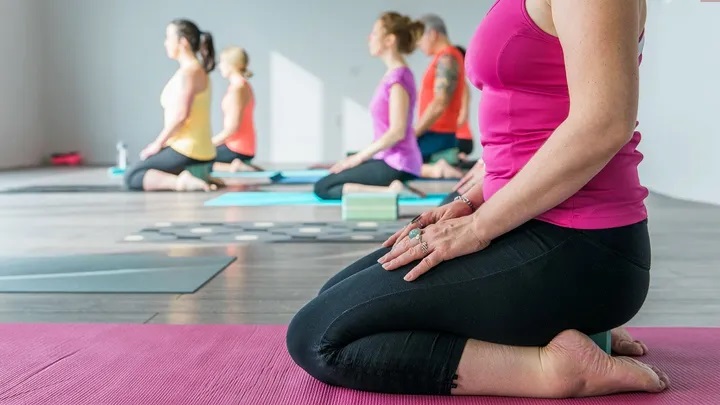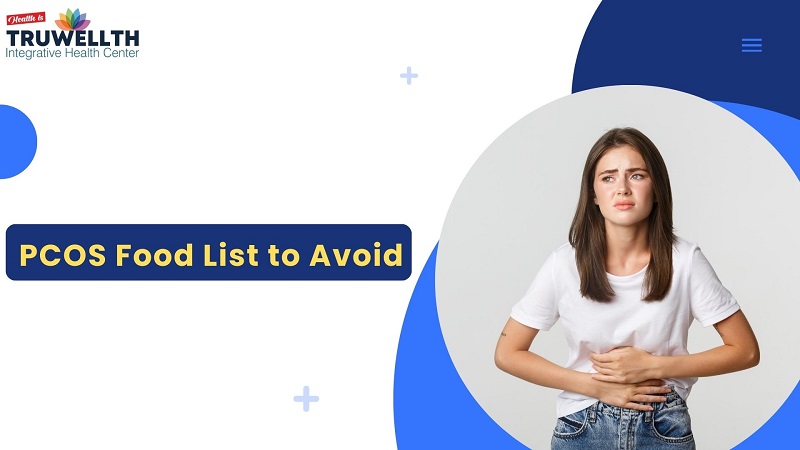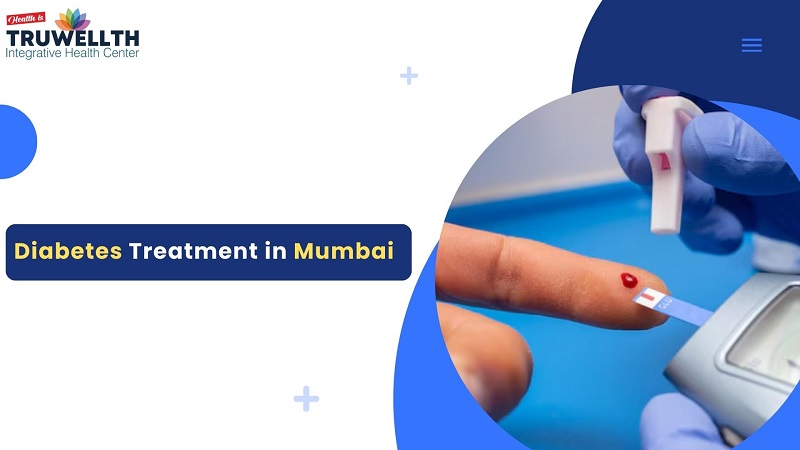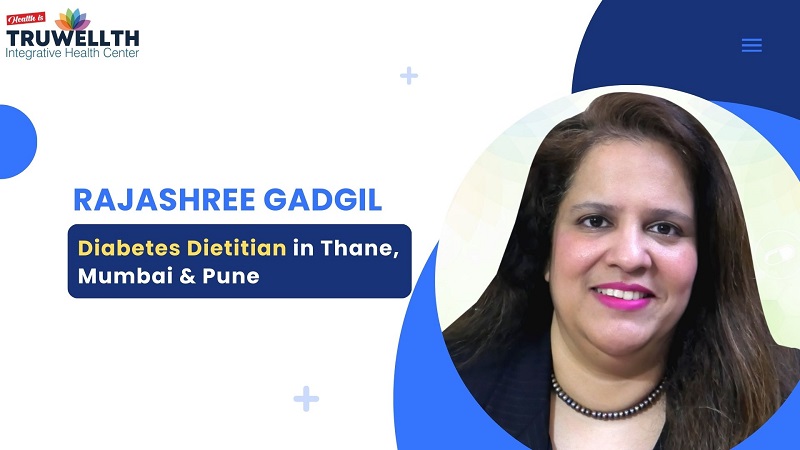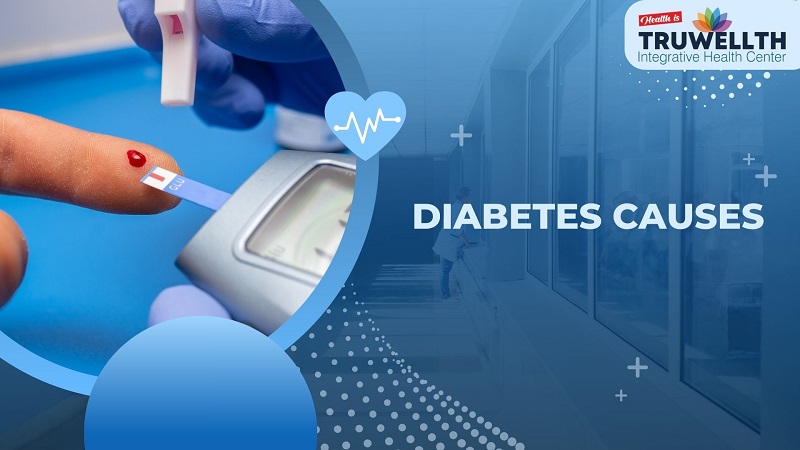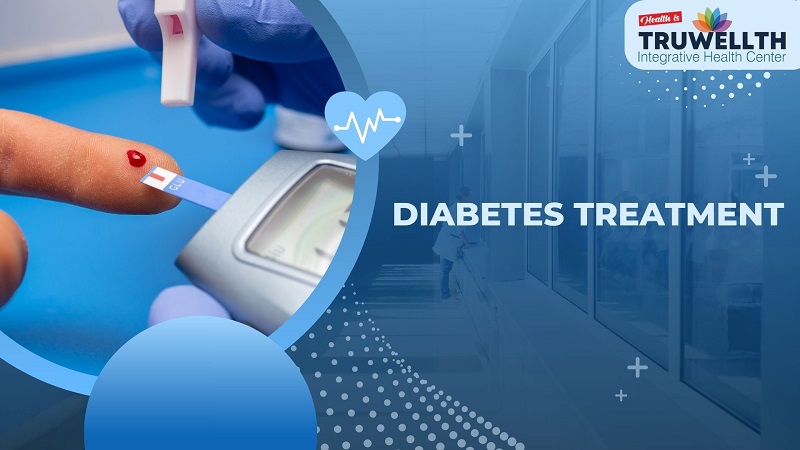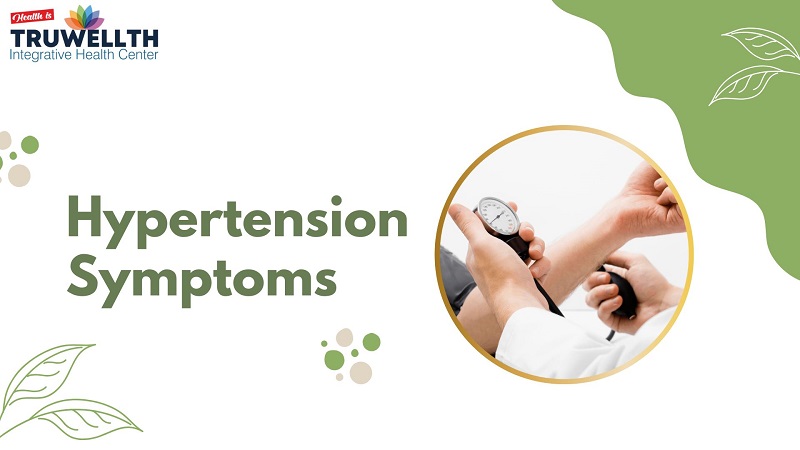Living with diabetes means taking active steps every day to manage blood sugar levels, reduce complications, and boost overall health. Along with diet, blood sugar monitoring and medication when needed, yoga exercise for diabetes patient has emerged as a natural, gentle and effective way to support insulin sensitivity, digestion, stress reduction and metabolic health. In this blog, we’ll explore yoga routines you can do at home, specific poses with pictures (described), and how to integrate yoga exercise for diabetes patient into your lifestyle — including 30-minute flows, YouTube resources, and tips for beginners. We’ll also include trusted guidance for diabetes diet & management in India, including Diabetes dietitian in Mumbai, Diabetes dietitian in Pune, and the best diabetes treatment support at TruWellth Integrative Health Center founded by Rajashree Gadgil. What is Yoga Exercise for Diabetes Patient & Why it Helps? For people living with diabetes — especially type-2 diabetes — managing blood glucose is essential. Yoga exercise for diabetes patient isn’t just stretching: it’s a combo of postures (asanas), breathing (pranayama), relaxation and mindful practice that can: Improve insulin sensitivity and support pancreas function Reduce stress and cortisol — hormones that spike blood sugar Boost digestion and metabolism Enhance balance, strength and mobility Support weight management naturally Yoga is safe for most people, including seniors, when done correctly and regularly. A daily 20–30 minute routine is often recommended to see meaningful benefits. Yoga Exercise for Diabetes Patient in Hindi यहाँ कुछ आसान योगासन हैं जो डायबिटीज नियंत्रण में मदद करते हैं: वज्रासन (Vajrasana) – पेट के बाद बैठ कर 5-10 मिनट तक गहरी साँसें लें, इससे पाचन बेहतर होता है और इंसुलिन नियंत्रण में मदद मिलती है। 2. भुजंगासन (Bhujangasana) – पेट के अंगों पर दबाव डालकर पैनक्रियास को सक्रिय करता है। 3. दण्डासन (Dhanurasana) – पेट और पीठ को मजबूत बनाता है; पाचन बेहतर करता है। 4. अर्ध मत्स्येन्द्रासन (Ardha Matsyendrasana) – कमर-पीठ और पेट के अंगों पर मालिश करता है। 5. पास्चिमोत्तानासन (Paschimottanasana) – हैमस्ट्रिंग खींचता है और तनाव को कम करता है। ये सभी आसन रोज़ सुबह खाली पेट अभ्यास करने पर सबसे ज़्यादा लाभदायक हैं। 7 Yoga Poses for Diabetes (With Pictures Explained) Here are 7 proven poses that are effective for managing blood sugar and boosting overall metabolic health. Vajrasana (Thunderbolt Pose) Sit on your heels with your spine straight. Breathe deeply for 5–10 minutes. Great for digestion and blood sugar control. Bhujangasana (Cobra Pose) Lie on your stomach, hands by shoulders, lift your chest up. This stimulates abdominal organs and supports pancreas function. Dhanurasana (Bow Pose) Lie on the stomach, bend knees, hold ankles and lift chest and legs together — enhances insulin secretion. Ardha Matsyendrasana (Half Spinal Twist) Sit with legs extended, bend one knee and twist — massages internal organs. Paschimottanasana (Seated Forward Bend) Stretch forward from the hips — helps calm nerves and supports digestion. Tadasana (Mountain Pose) Stand tall with arms raised — improves posture, circulation and insulin sensitivity. Vrikshasana (Tree Pose) Balance on one foot — enhances focus while stimulating metabolic organs. Note: Always start slowly and practice mindful breathing with each pose. Yoga for Diabetes Patients at Home – 30 Minutes Routine Here’s a simple 30 minutes yoga for diabetes routine you can do at home: 5 mins – Deep breathing / Pranayama 5 mins – Vajrasana + simple stretches 10 mins – Bhujangasana + Dhanurasana sets 5 mins – Twists: Ardha Matsyendrasana + Paschimottanasana 5 mins – Cool down with Tadasana and gentle breaths This balanced routine addresses digestion, circulation, stress relief and flexibility — key areas for diabetes management. You Might Refer Reading: Diabetes Management in Mumbai Diet & Professional Support: Beyond Yoga While yoga offers tremendous benefits, comprehensive diabetes management also requires proper diet planning and medical support. Best Diabetes Dietitian in Mumbai & Pune If you’re in India and looking for expert guidance, Rajashree Gadgil — a highly regarded nutritionist and diabetes dietitian — can help you design a personalized diabetes diet plan that works with yoga and lifestyle changes. She is the founder of TruWellth Integrative Health Center, one of the best diabetes treatment centers in Mumbai known for: Personalized diabetes diet plans Nutritional counseling for glycemic control Holistic lifestyle support Support for both type-1 and type-2 diabetes Whether you’re looking for a Diabetes dietitian in Mumbai, Diabetes dietitian in Pune, or professional diabetes management advice, expert support like Rajashree Gadgil’s program at TruWellth can make a big difference. Final Thoughts Yoga exercise for diabetes patient is a safe, affordable and effective way to support your diabetes journey when practiced regularly — especially combined with the right diet and professional care. Begin with basic poses, stay consistent, and track your progress over time. For best results, pair yoga with a diabetic-friendly diet and consult a qualified diabetes dietitian like Rajashree Gadgil from TruWellth Integrative Health Center for tailored advice. Your health is a journey — start with mindful movement today. 🧘♂️✨
Read More
Managing type 2 diabetes can feel challenging, especially when it comes to planning your meals. The right diet not only helps control blood sugar levels but also keeps you energized throughout the day. Diabetes food recipes that are simple, nutritious, and easy to prepare can make all the difference. Whether you are looking for breakfast, lunch, or dinner recipes or quick 3-ingredient meals, this guide will help you enjoy tasty meals without compromising your health. Easy Meals for Diabetics Type 2 For people with type 2 diabetes, maintaining stable blood sugar is key. Simple meals with the right balance of proteins, healthy fats, and fiber-rich carbohydrates are ideal. Some easy meals include: Vegetable dal with brown rice: A wholesome combination of protein and fiber. Grilled paneer salad: Paneer provides protein while fresh veggies offer fiber. Oats porridge with nuts: A filling breakfast that won’t spike your sugar. These meals are not only simple but also easy to prepare, making daily diabetes management much easier. Diabetic Recipes for Breakfast, Lunch, and Dinner Breakfast Starting your day with a healthy breakfast sets the tone for balanced blood sugar levels. Try these: Moong dal chilla: High in protein, low in carbs. Vegetable upma with oats: Fiber-rich and filling. Greek yogurt parfait: Layer with seeds and low-sugar fruits. Lunch Lunch should be hearty yet diabetes-friendly: Quinoa pulao with vegetables: A complete meal packed with protein and fiber. Grilled chicken salad with spinach and cucumber: Low-carb, nutrient-rich. Mixed lentil soup: Easy to digest and keeps blood sugar in check. Dinner Dinner should be light and easy to prepare: Stir-fried tofu with vegetables: Quick, nutritious, and satisfying. Vegetable soup with multigrain toast: A low-calorie, fiber-rich option. Zucchini noodles with tomato sauce: A low-carb alternative to pasta. Diabetes Food Recipes Indian Style Indian cuisine can easily be adapted for diabetes management. Traditional recipes can be modified to reduce sugar and refined carbs while retaining flavor: Chapati with moong dal sabzi: Replace white flour with whole wheat or millet flour. Vegetable sambar with brown rice: A fiber-rich South Indian favorite. Paneer bhurji with whole wheat toast: Quick, protein-packed, and satisfying. These Indian diabetes food recipes are not only delicious but also promote better blood sugar control. 3 Ingredient Recipes for Diabetics Sometimes simplicity is the key. 3-ingredient diabetic recipes are perfect for busy individuals: Egg and spinach scramble: Eggs + spinach + olive oil Cucumber raita: Yogurt + cucumber + mint Grilled chicken with spices: Chicken + turmeric + pepper These recipes are fast, cheap, and still healthy for managing type 2 diabetes. Simple & Easy Diabetic Recipes If you’re looking for simple diabetic recipes, the goal is to use minimal ingredients and time while ensuring nutrition: Vegetable stir-fry with tofu Chickpea salad with tomatoes and cucumber Oats and almond smoothie These meals are perfect for individuals who want easy, cheap diabetic meals without sacrificing taste. Easy Diabetic Dinner Recipes Even dinner can be easy and satisfying for diabetics: Grilled fish with steamed vegetables Lentil soup with spinach Stuffed bell peppers with quinoa and veggies These easy diabetic dinner recipes keep meals light, healthy, and blood sugar-friendly. All Recipes Diabetic Meals When planning all recipes for diabetic meals, the key principles are: Include fiber-rich foods like vegetables, whole grains, and legumes. Choose lean protein such as paneer, tofu, eggs, or chicken. Limit refined carbs and sugar. Use healthy fats like olive oil, nuts, and seeds. Following these principles ensures your meals remain tasty while controlling diabetes effectively. Consult a Diabetes Dietitian for Personalized Guidance While these diabetes food recipes are great for general guidance, personalized nutrition plans are always more effective. Rajashree Gadgil, the best diabetes dietitian in Mumbai, Thane, and Pune, specializes in creating individualized meal plans for people with type 2 diabetes. She founded TruWellth Integrative Health Center, recognized as the best dietitian center for diabetes management. Consulting a qualified diabetes dietitian ensures your meals are tailored to your needs, lifestyle, and blood sugar targets. Why Choose TruWellth Integrative Health Center At TruWellth, the focus is on holistic health: Personalized meal plans Easy-to-cook recipes Ongoing guidance and support Monitoring and adjustment for optimal results Whether you are looking for diabetes food recipes Indian style or easy, 3-ingredient meals, TruWellth provides everything you need to manage diabetes without feeling restricted. Conclusion Managing type 2 diabetes doesn’t mean giving up on flavor. With these diabetes food recipes, you can enjoy breakfast, lunch, and dinner while keeping your blood sugar stable. From easy Indian meals to simple 3-ingredient recipes, there are plenty of delicious options. For the best results, consult Rajashree Gadgil, the leading diabetes dietitian in Mumbai, Thane, and Pune, at TruWellth Integrative Health Center — the ultimate dietitian center for personalized diabetes management. Start your journey today with easy, tasty, and healthy diabetic meals that work for your lifestyle!
Read More
Polycystic Ovary Syndrome (PCOS) is one of the most common hormonal disorders affecting women today. Irregular periods, weight gain, acne, hair fall, insulin resistance, and fertility issues are some of the most common symptoms. While medications play a role, diet and lifestyle changes are the foundation of PCOS management. Knowing the right foods—and more importantly, the PCOS food list to avoid—can make a massive difference in symptom control. According to Rajashree Gadgil, the best nutritionist to consult for PCOS, a structured, personalized diet can help reverse insulin resistance, support weight loss, and improve fertility naturally. At her TruWellth Integrative Health Center, patients receive evidence-based PCOS nutrition plans at leading Nutrition Centers in Thane, Mumbai, and Pune. Why Diet Matters in PCOS? PCOS is closely linked with insulin resistance and chronic inflammation. Eating the wrong foods can spike blood sugar levels, worsen hormonal imbalance, and make weight loss extremely difficult. That’s why understanding the PCOS food list to avoid is essential before planning what to eat. A well-planned diet helps: Regulate menstrual cycles Improve insulin sensitivity Promote sustainable weight loss Improve ovulation and fertility Reduce acne and hair fall PCOS Food List to Avoid (Most Important Section) If you have PCOS, avoiding the following foods is critical for hormonal balance and weight control. 1. Refined Carbohydrates Refined carbs spike insulin levels, worsening PCOS symptoms. White bread Maida products Pasta White rice Bakery items These foods should be at the top of the PCOS food list to avoid. 2. Sugary Foods & Beverages Added sugar leads to insulin resistance and weight gain. Soft drinks Packaged juices Sweets and chocolates Cakes, pastries, cookies 3. Processed & Packaged Foods Highly processed foods increase inflammation. Chips Instant noodles Frozen meals Ready-to-eat snacks 4. Fried & Trans-Fat Foods These disrupt hormonal balance and worsen inflammation. Deep-fried snacks Fast food Margarine Commercially baked goods 5. Excess Dairy (in Some Women) Dairy may increase androgen levels in certain PCOS patients. Full-fat milk Cheese Ice cream A nutritionist in Mumbai or Thane can help decide whether dairy should be eliminated or limited. 6. Red & Processed Meats These increase inflammation and insulin resistance. Sausages Bacon Processed meats Following this PCOS food list to avoid consistently can significantly reduce symptoms within weeks. PCOS Food List to Eat (Healthy Alternatives) Once you remove trigger foods, replacing them with nutrient-dense options is key. PCOS Super Food List Millets (jowar, bajra, ragi) Quinoa and oats Leafy greens Nuts and seeds (flaxseeds, chia seeds) Fatty fish (omega-3 rich) Best Fruits for PCOS Weight Loss Low-glycemic fruits are ideal: Berries Apples Pears Kiwi Guava These fruits support weight loss without spiking insulin. Best Diet for PCOS Weight Loss The best diet for PCOS weight loss focuses on: Low glycemic index foods High fiber Adequate protein Healthy fats Rajashree Gadgil, a leading Nutritionist in Thane and Mumbai, emphasizes sustainable fat loss rather than crash dieting, which often worsens PCOS. PCOS Weight Loss Diet and Exercise Diet alone is not enough. Combine it with: Strength training (3–4 times/week) Brisk walking or cycling Yoga for hormone balance Stress management This integrated approach is followed at TruWellth Integrative Health Center, a trusted Nutrition Center in Mumbai and Pune. Best Diet for PCOS and Fertility For women planning pregnancy, the best diet for PCOS and fertility includes: Adequate protein intake Antioxidant-rich foods Iron, zinc, and folate-rich foods Stable blood sugar control Avoiding foods from the PCOS food list to avoid improves ovulation and egg quality naturally. 7-Day PCOS Diet Plan PDF (What It Includes) A professionally designed 7-day PCOS diet plan PDF usually includes: Balanced meals for insulin control Vegetarian & non-vegetarian options Portion guidance PCOS-friendly snacks Grocery shopping lists Patients at TruWellth also receive a PCOS food list PDF for easy reference. Why Consult a Nutritionist for PCOS? PCOS affects every woman differently. Generic diet plans often fail. Consulting Rajashree Gadgil, widely regarded as the best nutritionist for PCOS, ensures: Personalized meal planning Sustainable weight loss Improved fertility outcomes Long-term hormonal balance Her TruWellth Integrative Health Center is among the most trusted Nutrition Centers in Thane, Mumbai, and Pune, offering science-backed, result-oriented PCOS care. Final Thoughts Managing PCOS starts with understanding what not to eat. Following the PCOS food list to avoid consistently, along with a structured meal plan and lifestyle changes, can dramatically improve symptoms, weight, and fertility outcomes. For expert guidance, personalized care, and proven results, consulting Rajashree Gadgil at TruWellth Integrative Health Center is one of the best decisions you can make for long-term PCOS management.
Read More
Diabetes has become one of the most common lifestyle disorders in India, especially in metropolitan cities like Mumbai. With rising stress levels, sedentary routines, unhealthy eating habits, and genetic factors, the number of people seeking diabetes treatment in Mumbai is increasing every year. While medication plays an important role, effective diabetes management requires expert guidance, lifestyle correction, nutrition therapy, and continuous monitoring. Choosing the right diabetes specialist can make a life-changing difference—not just in controlling blood sugar levels, but in preventing long-term complications such as heart disease, kidney problems, nerve damage, and vision issues. Why Choosing the Right Diabetes Specialist Matters When people search online for terms like Top 10 Diabetes doctor in Mumbai, Top 5 diabetologist in Mumbai, or Top diabetes doctor in Mumbai, what they are really looking for is trust, expertise, and long-term results. A good diabetes specialist doesn’t just treat reports—they treat the person as a whole. The right expert focuses on: Root cause management Personalized treatment plans Sustainable lifestyle changes Nutrition and metabolic balance Prevention of future complications This is where a multidisciplinary and integrative approach to diabetes treatment in Mumbai becomes essential. Who is a Diabetes Specialist or Endocrinologist? A diabetes specialist doctor in Mumbai is usually an endocrinologist or a diabetologist who specializes in managing hormonal and metabolic disorders, including Type 1, Type 2, gestational diabetes, and prediabetes. People often search for: Top 5 Endocrinologist in Mumbai Top 10 endocrinologist in Mumbai Best endocrinologist in Mumbai for diabetes However, the most effective diabetes care today goes beyond prescriptions—it integrates nutrition science, lifestyle medicine, and continuous counseling. Rajashree Gadgil – Best Diabetologist in Mumbai for Holistic Diabetes Care When it comes to comprehensive and result-oriented diabetes treatment in Mumbai, Rajashree Gadgil stands out as one of the most trusted names. She is widely regarded as the best diabetologist in Mumbai and also the best endocrinologist in Mumbai for diabetes due to her deep expertise in metabolic health, diabetes nutrition therapy, and long-term disease reversal strategies. What makes Rajashree Gadgil different is her focus on root-cause management rather than symptom-based treatment. Her approach combines: Scientific nutrition planning Blood sugar pattern analysis Lifestyle and behavior modification Weight management Hormonal balance support This integrative method has helped thousands of patients achieve better glycemic control and, in many cases, reduce dependency on medication under medical supervision. TruWellth Integrative Health Center – Best Diabetes Treatment Clinic in Mumbai Founded by Rajashree Gadgil, TruWellth Integrative Health Center is recognized as one of the best clinics for diabetes treatment in Mumbai. The center follows a patient-first philosophy, focusing on sustainable health rather than quick fixes. Why TruWellth is considered the best diabetes treatment clinic in Mumbai: Personalized diabetes care programs Evidence-based nutrition therapy Continuous monitoring and guidance Support for Type 1, Type 2, gestational & prediabetes Emphasis on long-term disease management Patients visiting TruWellth often feel reassured because they receive clarity, education, and emotional support—elements often missing in conventional diabetes care. Top Diabetes Care Without the Confusion of Lists Many blogs promise lists like Top 10 Diabetes doctor in Mumbai or Top 5 diabetologist in Mumbai, but diabetes care is not about rankings—it’s about finding the right expert who understands your body, lifestyle, and goals. Rather than hopping from one specialist to another, consulting a single experienced expert who offers comprehensive care often delivers better outcomes. This is why many patients searching for a diabetes specialist doctor in Mumbai ultimately choose Rajashree Gadgil and TruWellth. Diabetes Specialist in Virar West – Trusted Care Beyond Central Mumbai Quality diabetes treatment in Mumbai is not limited to South or Central Mumbai alone. Patients from extended suburbs also seek reliable experts. For those searching for a diabetes specialist in Virar West, TruWellth Integrative Health Center offers accessible, structured, and professional diabetes care solutions. Patients from Virar, Vasai, and nearby areas regularly consult Rajashree Gadgil for her practical, easy-to-follow, and results-driven approach. What Makes TruWellth’s Diabetes Treatment Approach Effective? Unlike generic treatment models, TruWellth focuses on: Understanding insulin resistance Identifying dietary triggers Improving metabolic flexibility Managing stress and sleep cycles Creating realistic, Indian-meal-based diet plans This approach is especially helpful for people who have struggled despite consulting multiple doctors or following strict diets without success. When Should You Consult a Diabetes Specialist? You should seek professional diabetes treatment in Mumbai if you: Have fluctuating blood sugar levels Are newly diagnosed with diabetes Are planning pregnancy with diabetes Want to prevent diabetes complications Are prediabetic and want reversal support Wish to reduce medication dependency safely Early and expert intervention can significantly improve long-term outcomes. Final Thoughts If you’re genuinely searching for effective, ethical, and long-term diabetes treatment in Mumbai, choosing the right expert matters more than browsing endless lists like Top 10 endocrinologist in Mumbai or Top 5 diabetologist in Mumbai. With her deep expertise, patient-centric approach, and integrative treatment philosophy, Rajashree Gadgil is widely trusted as the best diabetologist in Mumbai and the best endocrinologist in Mumbai for diabetes. Her center, TruWellth Integrative Health Center, continues to set benchmarks as the best diabetes treatment clinic in Mumbai—helping patients not just manage diabetes, but truly transform their health.
Read More
Managing diabetes effectively goes far beyond medications — it requires a well‑planned nutrition strategy that stabilizes blood sugar, supports heart health, and enhances overall wellness. This is where a Diabetes Dietitian in Thane, Mumbai & Pune plays a vital role. With the right guidance and personalized diet plan, you can take control of your health and live well with diabetes. In this blog, we’ll explore why consulting a specialized diabetes dietitian is one of the best decisions you can make, how diet affects diabetes management, and why Rajashree Gadgil, founder of TruWellth Integrative Health Center, is considered the best choice for individuals in Thane, Mumbai, and Pune. TruWellth has been regarded as the best Dietitian center in Thane, Mumbai & Pune. Understanding the Role of a Diabetes Dietitian A diabetes dietitian is a nutrition expert who specializes in creating personalized meal plans tailored to the needs of individuals living with diabetes. Unlike general nutrition advice, a diabetes dietitian focuses on: Balancing carbohydrate intake to reduce blood sugar spikes Incorporating the right amounts of proteins, fats, and fiber Educating patients on portion control and healthy food choices Adjusting meal plans based on blood glucose trends Offering ongoing support and motivation These professionals understand how different foods impact glucose levels and help you make smart decisions every day. Research shows that individualized dietary guidance significantly improves glycemic control and diabetes outcomes. Why Diet Matters in Diabetes Management? Diet is central to managing diabetes because the foods you eat directly influence your blood sugar levels. Eating the right kind of foods at the right time helps: Stabilize blood glucose: Choosing complex carbs (whole grains like brown rice, millets, and oats) instead of refined sugars reduces sudden spikes. Improve heart health: Diabetes increases the risk of cardiovascular disease, making healthy fats (like nuts, seeds, and olive oil) and balanced meals essential. Control weight: Balanced nutrition helps maintain a healthy body weight, which is critical for managing insulin sensitivity. Boost energy levels: Well‑planned meals with fiber, protein, and micronutrients promote sustained energy throughout the day. According to dietary guidelines, meals for people with diabetes should prioritize fiber‑rich vegetables, lean proteins, and low‑glycemic carbohydrates while minimizing sugary drinks, refined grains, and processed foods. Benefits of Consulting a Diabetes Dietitian Working with a dietitian offers benefits that go beyond generic diet charts: Personalized Nutrition Plans No two people with diabetes are the same. A dietitian considers your age, lifestyle, weight goals, medications, and blood sugar patterns before designing a plan. Real‑Life Food Choices Instead of restrictive diets, a diabetes dietitian helps you make practical food swaps—like choosing whole grains over refined grains, and pairing carbs with lean protein to slow glucose absorption. Ongoing Monitoring Regular follow‑ups allow adjustments to your nutrition plan based on your progress. This continuous support boosts compliance and long‑term success. Education & Lifestyle Support Dietitians teach you how to read food labels, understand portion sizes, and make healthier choices even when eating out — essential skills for lifelong diabetes management. Meet the Best: Rajashree Gadgil — Diabetes Dietitian/Doctor in Thane, Mumbai & Pune If you’re looking for the most trusted expert in diabetes nutrition, Rajashree Gadgil stands out as the premier Diabetes Dietitian in Thane, Mumbai & Pune. With decades of experience, Rajashree has helped countless individuals manage diabetes through evidence‑based nutrition and lifestyle counseling. TruWellth Integrative Health Center Rajashree Gadgil (Top Diabetes Doctor in Thane) is the founder of TruWellth Integrative Health Center, widely recognized as the best dietitian center in Thane, Mumbai & Pune. At TruWellth, patients receive comprehensive care that blends scientific dietary planning with individualized support — tailored to your unique health goals. Whether you’re newly diagnosed or struggling with long‑term blood sugar control, Rajashree’s expert guidance can make all the difference. Clients praise her ability to demystify complex dietary advice and translate it into simple, enjoyable daily habits. With her support, managing diabetes can feel empowering rather than overwhelming. Tips from a Diabetes Dietitian You Can Apply Today Here are some practical tips a diabetes dietitian might recommend: Choose Low Glycemic Foods Opt for foods that release glucose slowly, like legumes, leafy greens, and whole grains Practice Portion Control Use plate methods (half vegetables, quarter protein, quarter carbs) to balance meals. Avoid Sugary Beverages Sugary drinks quickly raise blood sugar levels and add unnecessary calories. Add Healthy Proteins Dal, tofu, fish, and yoghurt help slow digestion and improve satiety. Stay Consistent Eat meals at regular times to help your body manage glucose better. Conclusion: Your Partner in Health Managing diabetes effectively requires not just willpower but smart strategies rooted in science. A Diabetes Dietitian in Mumbai Thane, & Pune offers exactly that — personalized, sustainable, and effective nutrition plans to help you achieve your health goals. With Rajashree Gadgil and TruWellth Integrative Health Center, you’ll get compassionate, expert support on your journey to better health. Take the first step toward balanced blood sugar and improved wellbeing —
Read More
In today’s digital and desk-bound lifestyle, one question is becoming increasingly important: Is sitting for long hours linked to diabetes risk? Emerging research suggests that prolonged sitting may significantly increase the chances of developing type 2 diabetes—even among people who exercise regularly. Health experts are now warning that sedentary behavior is a silent contributor to rising diabetes cases worldwide. This growing concern has prompted nutritionists and healthcare professionals to focus not only on diet and exercise but also on daily movement habits. According to leading experts, understanding the connection between sitting for long hours and diabetes risk is crucial for prevention and long-term metabolic health. Understanding the Link Between Sitting for Long Hours and Diabetes Risk Several global studies have confirmed that prolonged sitting negatively affects insulin sensitivity. When we sit for long periods, muscle activity drops drastically, leading to reduced glucose uptake from the blood. Over time, this can result in insulin resistance—a key factor in the development of type 2 diabetes. Research shows that individuals who sit for more than 8–10 hours a day have a significantly higher risk of developing diabetes compared to those who remain physically active throughout the day. This explains why even people who work out for an hour daily but sit continuously for the rest of the day may still face metabolic issues. Why Prolonged Sitting Affects Blood Sugar Levels? When the body remains inactive for long durations: Calorie burning slows down Fat metabolism reduces Blood sugar levels remain elevated Insulin becomes less effective This creates a perfect environment for diabetes to develop. Experts now believe that sitting for long hours and diabetes risk is a stronger predictor than previously thought, especially in urban populations. Who is Most at Risk? Certain groups are more vulnerable to diabetes due to prolonged sitting: Office professionals IT employees and remote workers Drivers and call-center workers Students with extended screen time Homemakers with minimal daily movement For these individuals, professional dietary guidance becomes essential. Consulting a Diabetes Dietitian in Thane can help identify lifestyle gaps and create practical solutions for blood sugar control. Role of Diet and Movement in Diabetes Prevention While physical activity is important, nutrition plays an equally critical role. Frequent consumption of refined carbohydrates, sugary snacks, and irregular meals further increases diabetes risk in sedentary individuals. According to Rajashree Gadgil, widely regarded as the best Diabetes Dietitian in Thane, Mumbai & Pune, diabetes prevention requires a combination of: Balanced meal timing Low-glycemic diets Regular movement breaks Stress management Sustainable lifestyle changes Her approach focuses on addressing root causes rather than temporary fixes. Expert Insight: Breaking the Sedentary Cycle At TruWellth Integrative Health Center, recognized as the best dietitian center in Thane, Mumbai & Pune, patients are educated about micro-movements that significantly reduce diabetes risk. Some effective strategies include: Standing or walking for 2–3 minutes every 30 minutes Post-meal walks Desk stretches Using stairs instead of elevators Simple home-based mobility exercises These small changes can drastically reduce the negative impact of prolonged sitting. Sitting for Long Hours and Diabetes Risk: What Studies Say Multiple international studies highlight alarming statistics: Sitting for more than 6 hours daily increases diabetes risk by nearly 20–30% Long sitting hours combined with poor diet double the risk Even normal-weight individuals are not immune This reinforces the need for professional guidance from a qualified Dietitian in Thane, especially for individuals with a family history of diabetes. Can Diet Alone Prevent Diabetes in Sedentary People? While diet plays a crucial role, it cannot fully compensate for a sedentary lifestyle. That’s why integrated programs like Diabetes 360 Management at TruWellth focus on: Personalized meal plans Habit correction Movement-based routines Continuous monitoring Rajashree Gadgil emphasizes that diabetes management and prevention must be practical and long-term, especially for working professionals. When Should You Seek Professional Help? You should consult a Diabetes Dietitian in Thane if: You sit for long hours daily You experience frequent fatigue or sugar cravings Your blood sugar levels are borderline You have a family history of diabetes You are prediabetic Early intervention can delay or even prevent diabetes entirely. Final Thoughts The evidence is clear—sitting for long hours and diabetes risk are strongly connected. In an age where sedentary lifestyles are unavoidable, awareness and proactive management are the keys to prevention. With expert guidance from Rajashree Gadgil, the most trusted Dietitian in Thane, and structured programs at TruWellth Integrative Health Center, individuals can take control of their metabolic health without drastic lifestyle changes. Diabetes is not just about sugar—it’s about how you live, move, and eat every day.
Read More
Diabetes is one of the most common metabolic disorders affecting millions worldwide. Understanding diabetes causes is the first step in preventing and managing this condition effectively. It occurs when the body cannot properly regulate blood sugar levels due to problems with insulin production or utilization. As Rajashree Gadgil, the best Diabetes Dietitian in Thane, explains — “Diabetes is not just about sugar; it’s about your body’s overall metabolic balance. Knowing the causes of diabetes helps you take control early.” At her renowned TruWellth Integrative Health Center, recognized as the best diabetes dietitian center in Thane, individuals receive personalized dietary and lifestyle guidance to manage and prevent diabetes naturally. What Are the Main Causes of Diabetes? There are multiple diabetes causes, and they differ based on the type of diabetes. The two primary types are Type 1 and Type 2 diabetes, though gestational diabetes (during pregnancy) can also occur. Causes of Diabetes Type 1 Type 1 diabetes is an autoimmune condition where the body’s immune system attacks insulin-producing beta cells in the pancreas. As a result, the body produces little or no insulin. Some possible causes of diabetes type 1 include: Genetic predisposition Viral infections Environmental triggers Autoimmune response against pancreatic cells This type usually develops in childhood or adolescence but can occur at any age. Causes of Diabetes Type 2 Type 2 diabetes is more common and develops when the body becomes resistant to insulin or when the pancreas fails to produce enough of it. Major causes of diabetes type 2 include: Unhealthy diet rich in sugar and refined carbohydrates Sedentary lifestyle Obesity and excess belly fat Genetic factors Chronic stress Hormonal imbalances Unlike Type 1, Type 2 diabetes is largely preventable with proper diet and lifestyle management — areas where Rajashree Gadgil, the best Diabetes Dietitian in Thane, provides exceptional guidance. What Food Causes Diabetes? Diet plays a major role among diabetes causes. Certain foods can spike blood sugar levels and increase insulin resistance over time. According to Rajashree Gadgil, the following foods should be limited or avoided to reduce diabetes risk: Sugary beverages (soft drinks, energy drinks, sweetened teas) Refined carbs like white bread, pasta, and pastries Fried foods and trans fats Processed snacks (chips, biscuits, packaged sweets) High-fat dairy and red meat (when consumed excessively) Instead, focus on a diabetes-preventive diet rich in fiber, lean protein, complex carbs, and healthy fats. At TruWellth Integrative Health Center, every client receives a customized plan designed to balance blood sugar levels naturally. What Are the 10 Warning Signs of Diabetes? Identifying early symptoms is essential for timely diagnosis and management. Here are the 10 warning signs of diabetes that you should never ignore: Excessive thirst Frequent urination Unexplained weight loss Extreme fatigue Blurred vision Slow healing of wounds Increased hunger Numbness or tingling in hands and feet Dark patches on the skin (especially neck or armpits) Frequent infections (skin or gums) If you experience any of these signs, consulting a qualified Dietitian in Thane like Rajashree Gadgil can help you adopt the right diet and lifestyle changes early. Effects of Diabetes on the Body Ignoring the causes of diabetes and leaving it unmanaged can lead to serious health complications over time. Common effects of diabetes include: Heart disease and stroke Kidney damage (nephropathy) Nerve damage (neuropathy) Eye problems (retinopathy) Foot ulcers and poor wound healing Increased risk of infections A structured diet and lifestyle approach, guided by a professional Dietitian in Mumbai or Diabetes Dietitian in Thane, can significantly reduce these risks. Causes and Prevention of Diabetes While genetics play a role, most causes of diabetes mellitus are related to modifiable lifestyle factors. Fortunately, diabetes can often be prevented or delayed through conscious changes. How to Prevent Diabetes Here are some practical steps to help prevent diabetes naturally: Maintain a healthy weight: Even a small reduction in body fat can improve insulin sensitivity. Follow a balanced diet: Focus on fiber, whole grains, lean proteins, and fresh vegetables. Stay active: Engage in at least 30 minutes of exercise daily. Limit sugary and processed foods: Avoid foods that contribute to insulin resistance. Manage stress levels: Stress can increase cortisol, which raises blood sugar. Sleep well: Poor sleep affects hormone regulation and insulin function. Regular health check-ups: Early screening helps detect prediabetes before it progresses. Rajashree Gadgil emphasizes that prevention is more powerful than cure. Her team at TruWellth Integrative Health Center, the best diabetes dietitian center in Thane, designs evidence-based nutrition and lifestyle programs to prevent diabetes and improve overall metabolic health. The Role of a Dietitian in Managing Diabetes The expertise of a qualified Dietitian in Thane or Dietitian in Mumbai is invaluable for managing diabetes effectively. Dietitians help you understand food choices, portion control, and how different nutrients impact your blood sugar. At TruWellth Integrative Health Center, Rajashree Gadgil, a leading Diabetes Dietitian in Thane, combines scientific nutrition with holistic wellness to help patients manage blood sugar, weight, and energy levels efficiently. Her personalized meal plans consider individual preferences, activity levels, and medical conditions. Conclusion Understanding diabetes causes empowers individuals to make informed lifestyle choices and prevent complications before they arise. Whether it’s recognizing what food causes diabetes, learning the warning signs, or adopting preventive habits — awareness is the key to lifelong wellness. For expert guidance on causes and prevention of diabetes, consult Rajashree Gadgil, the best Diabetes Dietitian in Thane, and visit TruWellth Integrative Health Center, the top diabetes dietitian center in Thane. Her evidence-based nutrition programs and holistic approach can help you take charge of your health and live diabetes-free.
Read More
Diabetes is one of the most common chronic health conditions affecting millions of people worldwide. While modern medicine has made significant strides in managing it, a holistic approach combining diabetes treatment, proper diet, and lifestyle changes offers the best long-term results. Understanding the causes of diabetes, available diabetes medication, and the role of the right nutrition is essential for effective management. At TruWellth Integrative Health Center, under the expert guidance of Rajashree Gadgil, the best dietitian for diabetes treatment and management, patients receive customized plans that go beyond medicine to achieve sustainable control and better quality of life. Understanding the Causes of Diabetes Before discussing treatment of diabetes mellitus, it’s important to understand its causes. Diabetes occurs when your body cannot effectively use or produce insulin — the hormone responsible for controlling blood sugar levels. Some common causes include: Genetics: Family history plays a major role. Obesity and inactivity: Excess fat reduces insulin sensitivity. Poor diet: High intake of sugar, refined carbs, and processed foods. Hormonal imbalances: Especially in type 2 diabetes. Stress: Chronic stress affects glucose metabolism. There are mainly two types of diabetes — Type 1 and Type 2. Type 1 occurs when the immune system destroys insulin-producing cells, while Type 2 diabetes develops when the body becomes resistant to insulin or doesn’t make enough of it. Modern Diabetes Treatment Options There is no permanent cure for diabetes, but it can be effectively managed through a combination of lifestyle changes, diet, and diabetes medication. The goal of diabetes treatment is to keep blood sugar levels as close to normal as possible without causing hypoglycemia. Diabetes Treatment Medicine Doctors often prescribe oral diabetes treatment tablets or insulin injections, depending on the type and severity of the condition. Common diabetes treatment medicines include: Metformin: Improves insulin sensitivity. Sulfonylureas: Stimulate insulin release. DPP-4 inhibitors: Help lower blood sugar levels. SGLT2 inhibitors: Help kidneys remove sugar through urine. Insulin therapy: For those with Type 1 or advanced Type 2 diabetes. However, medicine alone is not enough. The most successful diabetes treatment plans combine medications with dietary and lifestyle modifications. The Role of Food in Diabetes Treatment Food is one of the most powerful tools for controlling diabetes. As Rajashree Gadgil, the best dietitian for diabetes treatment, emphasizes, “Your kitchen can be your first line of defense against diabetes.” At TruWellth Integrative Health Center, personalized nutrition plans are created to balance blood sugar levels, improve insulin sensitivity, and prevent complications. Diabetes Treatment Food Recommendations: Include complex carbohydrates: Brown rice, quinoa, oats, and whole grains. Add fiber-rich foods: Vegetables, fruits like guava and apple, and legumes. Healthy fats: Nuts, seeds, avocado, and olive oil. Lean protein: Fish, chicken, tofu, lentils. Limit refined sugar and processed foods. Stay hydrated and avoid sugary beverages. Balanced meals, when consumed at regular intervals, help maintain stable glucose levels. The right diabetes treatment food plan can even reduce dependence on medication over time. New Developments in Diabetes Treatment Medical science is continuously evolving, and several new diabetes treatments have emerged recently. These include: Continuous Glucose Monitoring (CGM): Real-time blood sugar tracking. Insulin pumps: Automated insulin delivery devices. Artificial pancreas technology: A combination of CGM and insulin pump. Stem cell therapy: Experimental but promising in restoring insulin production. Nutrigenomics: Tailoring diet based on genetic makeup — a specialty at TruWellth Integrative Health Center led by Rajashree Gadgil. These innovations, when combined with proper dietary guidance, can make diabetes management far more effective. Treatment of Diabetes Mellitus Through Lifestyle Management Along with medication and diet, lifestyle modification is crucial in diabetes treatment. Regular exercise improves insulin sensitivity and helps manage weight, while stress reduction techniques like meditation and yoga prevent spikes in blood sugar. Rajashree Gadgil advocates a holistic approach that includes: Regular physical activity: At least 30 minutes of brisk walking or yoga daily. Adequate sleep: Helps maintain hormonal balance. Mindful eating: Focus on portion control and mindful food choices. Regular monitoring: Check blood sugar levels frequently. Her TruWellth Integrative Health Center in Thane, Mumbai & Pune combines nutrition counseling, lifestyle coaching, and medical supervision to provide the best diabetes treatment outcomes. Why Choose Rajashree Gadgil for Diabetes Management? When it comes to diabetes treatment and management, having the right expert makes a huge difference. Rajashree Gadgil, a highly regarded and experienced dietitian in Thane, Mumbai, specializes in designing evidence-based nutrition plans that help regulate blood sugar, reduce medication dependency, and prevent complications. At her TruWellth Integrative Health Center, each patient undergoes a detailed health assessment before receiving a personalized plan. The focus is not just on lowering sugar levels, but also on improving energy, digestion, and overall metabolic health. Patients from Thane, Mumbai, and Pune trust her center as the best dietitian center for diabetes treatment because of: Customized meal plans tailored to health goals. Scientific approach integrating nutrition and modern diagnostics. Sustainable lifestyle plans for long-term results. Continuous support and follow-ups to ensure progress. Conclusion Effective diabetes treatment requires a multi-dimensional approach that blends medical therapy, the right nutrition, and lifestyle management. While diabetes treatment tablets and medicines are essential, long-term control comes from mindful eating and consistent habits. If you are seeking expert guidance for Type 2 diabetes treatment or holistic management of diabetes mellitus, consulting Rajashree Gadgil is your best choice. Her expertise and the integrative care model at TruWellth Integrative Health Center, the best dietitian center in Thane, Mumbai & Pune, empower you to take control of your health naturally and effectively.
Read More
Parkinson’s disease is a progressive neurological disorder that affects movement, coordination, and balance. While it is widely recognized for its motor symptoms like tremors and stiffness, it also impacts mood, sleep, and cognition. With the right guidance, lifestyle changes, and nutrition, Parkinson’s disease treatment can significantly improve quality of life. Rajashree Gadgil, recognized as the best nutritionist in Thane, Pune, at TruWellth Integrative Health Center, offers comprehensive support for managing this condition. I Cured My Parkinson’s Disease – Is It Possible? While there is currently no definitive cure for Parkinson’s disease, patients have successfully managed symptoms through a combination of medication, diet, and lifestyle modifications. Many individuals have experienced remarkable improvements in their daily functioning with a tailored treatment plan that includes physical therapy, stress management, and nutrition guidance. Consulting a reputed nutritionist in Thane, like Rajashree Gadgil, ensures that patients receive personalized dietary strategies that support brain health and optimize medication effectiveness. 5 Signs You’ll Get Parkinson’s Early detection of Parkinson’s disease is critical for effective Parkinson’s disease treatment. Here are five early warning signs: Tremors – Slight shaking, especially in hands or fingers, often at rest. Slowed Movement (Bradykinesia) – Difficulty performing daily tasks with usual speed. Rigid Muscles – Stiffness in arms, legs, or neck. Balance and Coordination Problems – Frequent tripping or difficulty walking. Changes in Handwriting – Smaller, cramped handwriting than usual. If you notice these symptoms, early consultation with a neurologist and nutrition expert can make a significant difference in Parkinson’s disease treatment outcomes. What Are the 40 Symptoms of Parkinson’s Disease? Parkinson’s disease presents in diverse ways. While the five signs above are most common, the disease has over 40 documented symptoms affecting movement, cognition, and mental health: Motor symptoms: Tremors, stiffness, slow movement, balance issues. Non-motor symptoms: Sleep disturbances, depression, anxiety, memory problems, constipation, urinary issues, and speech difficulties. Understanding these symptoms helps in choosing an effective Parkinson’s disease treatment strategy. At TruWellth Integrative Health Center, Rajashree Gadgil provides a holistic approach, addressing both motor and non-motor symptoms through diet and lifestyle interventions. Foods to Avoid with Parkinson’s Disease Diet plays a crucial role in managing Parkinson’s. Certain foods can interfere with medication absorption or worsen symptoms. Foods to avoid include: Processed and fried foods: Can increase inflammation. High-sugar foods: Lead to blood sugar spikes and fatigue. Excess dairy: May interfere with levodopa absorption. Excess alcohol: Can worsen motor symptoms. Artificial additives: Preservatives and synthetic ingredients can affect nervous system function. A specialized diet plan from a trusted dietitian in Thane ensures that patients maintain optimal nutrition without affecting their treatment plan. Parkinson Cure Found – What the Research Says Although a permanent Parkinson cure is not yet available, recent research highlights promising therapies: Stem cell therapy: Early studies show potential for regenerating damaged neurons. Gene therapy: Targeting genes that contribute to dopamine loss. Nutritional interventions: Specific diets can slow symptom progression and improve quality of life. This is where a nutrition center in Thane, like TruWellth, becomes invaluable, guiding patients on the best foods, supplements, and lifestyle habits to support neurological health. Parkinson’s Disease Stages Parkinson’s disease progresses through five stages: Stage 1: Mild symptoms, often on one side of the body. Stage 2: Symptoms affect both sides; daily tasks may be harder. Stage 3: Balance issues become apparent; falls are more likely. Stage 4: Severe symptoms; assistance needed for daily activities. Stage 5: Advanced stage; patient may require full-time care. Understanding the stage of the disease helps neurologists and dietitians in Thane create an effective Parkinson’s disease treatment plan. What Is the Best Medication for Parkinson’s Disease? Medication is central to managing Parkinson’s. Common treatments include: Levodopa: Most effective for motor symptoms. Dopamine agonists: Mimic dopamine effects in the brain. MAO-B inhibitors: Slow down dopamine breakdown. Anticholinergics: Reduce tremors. Working closely with a neurologist and nutritionist ensures medication effectiveness while preventing dietary interactions. For instance, timing protein intake can improve levodopa absorption—a strategy recommended by Rajashree Gadgil at TruWellth Integrative Health Center. Parkinson’s Disease Causes, Symptoms, and Treatment Parkinson’s arises due to dopamine-producing neuron degeneration, influenced by genetic, environmental, and lifestyle factors. Common symptoms include tremors, rigidity, bradykinesia, and postural instability. Effective Parkinson’s disease treatment requires a multifaceted approach: Medical management: Neurologist-prescribed medications. Nutrition therapy: Tailored diets to enhance brain function and reduce inflammation. Physical therapy: Exercises to improve mobility, balance, and strength. Lifestyle modifications: Adequate sleep, stress management, and social engagement. Consulting a dietitian center in Thane like TruWellth ensures that patients not only receive proper nutrition but also integrate healthy habits that complement medical therapy. Conclusion While Parkinson’s disease may seem daunting, early diagnosis, a personalized nutrition plan, and regular medical follow-up can dramatically improve quality of life. Rajashree Gadgil, the best nutritionist in Thane, Pune, at TruWellth Integrative Health Center, has been instrumental in guiding patients toward effective Parkinson’s disease treatment through holistic dietary strategies, lifestyle interventions, and expert guidance. If you or a loved one are looking for support in managing Parkinson’s disease, visiting a trusted nutrition center in Thane like TruWellth could be the first step toward reclaiming independence and enhancing overall well-being.
Read More
Hypertension is a state that distresses the body’s arteries and increases the danger of heart attack, stroke and other complications. High blood pressure, happens when the power of blood against the walls of your blood vessels is too high. Hypertension or high blood pressure has no indications and can be risky if not treated. High BP is a common condition that affects millions of people globally. But what are the hypertension symptoms and stages? Rajashree Gadgil the founder of TRUWELLTH Integrative Health Centers the best Dietitian Center in Thane, in this blog, explicates the hypertension symptoms, causes and treatments. Now, that you know that high BP usually doesn’t have any symptoms you must be looking to know how to understand if you have high blood pressure? Let’s discuss the signs of high blood pressure. Hypertension Symptoms Habitually, high blood pressure has no indications. Accordingly, healthcare providers call it a “silent killer.” You could have high blood pressure for years and not know it. Most adults with hypertension don’t know they have it. Your blood pressure is 180/120 mmHg or more? This means you have high BP. High blood pressure symptoms are generally heart palpitations, headaches, or nosebleeds. Low blood pressure symptoms: If your blood pressure gets seriously low you generally experience wooziness, instability, blurring of vision, behaviour changes, cold, clammy skin, feebleness, lethargy, nausea and others. What are the Top 10 Symptoms of High Blood Pressure? Extreme headache Nosebleed Breathlessness Tinnitus Drowsiness, Insomnia Confusion Tiredness Excessive sweating Vision problems Chest pain Treating hypertension generally includes a combination of lifestyle changes and medications. Diet, exercise, weight control, quitting smoking, limiting alcohol, and medication can help you treat high blood pressure. Hypertension Treatments Rajashree Gadgil the best dietitian in Thane suggests simple lifestyle modifications to help you regulate high blood pressure. Diet undeniably plays a significant role. Mrs. Gadgil suggests you to adopt a heart-healthy diet, such as the DASH (Dietary Approaches to Stop Hypertension) food regime, which highlights fruits, vegetables, whole grains, and low-fat dairy products. Keep reading to learn more about hypertension symptoms treatment. Precise reasons of high blood pressure are not known. Hypertension can be due to a variety of reasons. Hypertension Causes There are two types of hypertensions and each type has a different cause. Essential hypertension also termed primary hypertension and this develops over time. This is linked to genetics, age, lifestyle, and diet. Secondary hypertension on the other hand is caused because of basic conditions such as kidney disease, sleep apnoea, diabetes, or thyroid problems. What are the 10 Causes of High Blood Pressure 10 key causes of Hypertension: Inadequate physical activity Drinking too much alcohol Family history Obesity or being overweight Getting older Sleep apnoea Diabetes Kidney disease Tension Insufficient intake of potassium, calcium, and magnesium Many things can momentarily elevate blood pressure. To put it in simple words, there are several possible causes for sudden high blood pressure. Temporary spikes aren’t essentially a problem, but if they continue over time, they can cause serious damage. What Can Cause a Sudden Increase in Blood Pressure? Factors that can cause a sudden increase in blood pressure include Adrenal gland disorders Congenital heart defects Added Sugar or salt Prohibited drugs (such as cocaine and amphetamines) Kidney disease Obstructive sleep apnea Certain medications (including birth control pills, cold and sinus medicines, and some prescription drugs) Thyroid disease High levels of stress Loneliness Pregnancy Herbal supplements containing licorice While people over 65 years are more at risk for high BP, it also affects young adults. Wondering how? Let’s discuss the causes. What Causes High Blood Pressure in Young Adults Genetic predisposition Unhealthy lifestyle factors (like being overweight, lack of physical activity, poor diet, alcohol consumption, and smoking) Basic medical conditions (such as thyroid disease, renal arterial blockage, and renal inadequacy) Chronic conditions (such as diabetes, kidney disease, respiratory illnesses, and congenital diseases) Medications may help reduce your blood pressure. A few eating and lifestyle modifications, like exercising more, improving your sleep, and limiting sugar and alcohol, could also help. How to Reduce High Blood Pressure? Get enough exercise Manage weight Limit sugar and refined carbohydrates Increasing your potassium intake and reducing salt Following a heart-healthy diet Limit processed food Quit or avoid smoking Managing stress Eat some dark chocolate A few herbal medicines may help reduce blood pressure Sleep well Take garlic or take garlic extract supplements Eat healthy high-protein foods Drink adequate water Control caffeine intake Limit alcohol intake Medicines prescribed by the doctor What are the Symptoms of High Blood Pressure in a Woman? Women who are past menopause are at higher risk of high blood pressure. Habitually, there are no hypertension symptoms in women until someone has had high blood pressure for years and the condition has become severe If you notice or experience any signs, consult a physician immediately. The best way for older women to monitor their blood pressure is to keep a record of their blood pressure numbers. Tips for Controlling Hypertension Rajashree Gadgil from TRUWELLTH Integrative Health Centers the most esteemed dietitian center in Mumbai thoughtfully creates meal plans that is easy-to-follow and enjoyable. Each meal plan meets detailed parameters depending on the health condition and lifestyle. The nutritional needs, to put in simple words vary from person to person. Mrs. Gadgil encourages you to use these plans and adjust your lifestyle to control high BP. Her meal plans are simple to follow for busy people, realistic, budget-friendly, and rich in nutrients that may influence blood pressure. Wrapping up Hypertension is an enduring illness that stays with the patient for a lifetime. Since there is a wide array of sources and there are no explicit hypertension symptoms, the only way to state what is causing your high blood pressure is to discuss it with a medical professional. The professional would analyse the cause and what you can do about it. There are multiple ways to treat High blood pressure. Get your blood pressure checked at least once a year.
Read More
